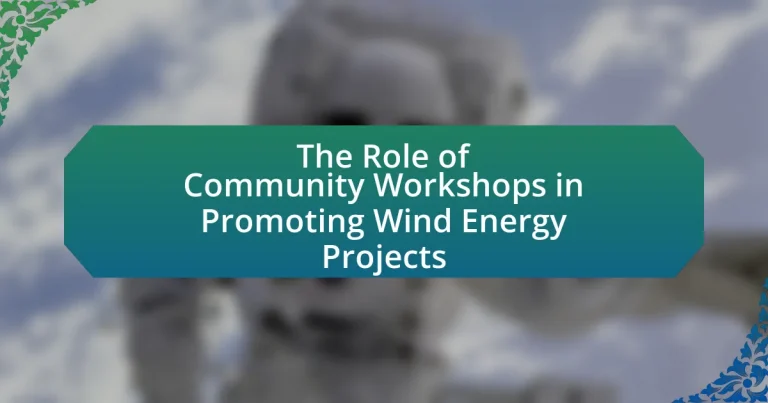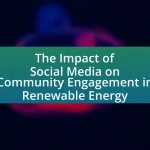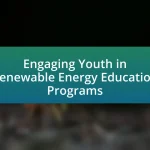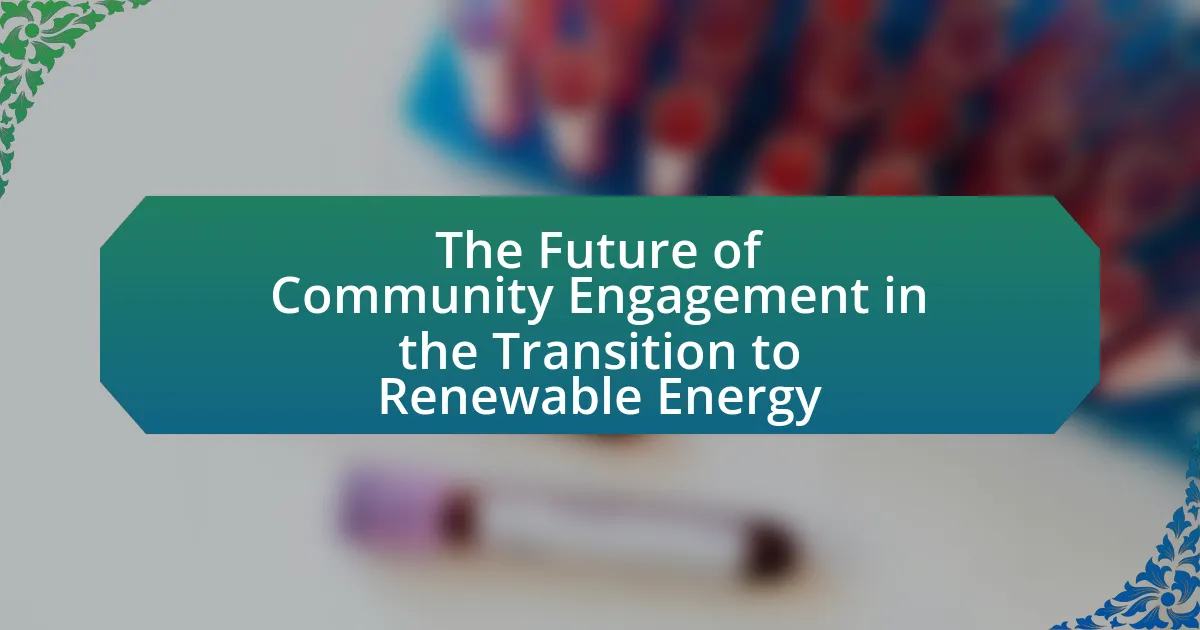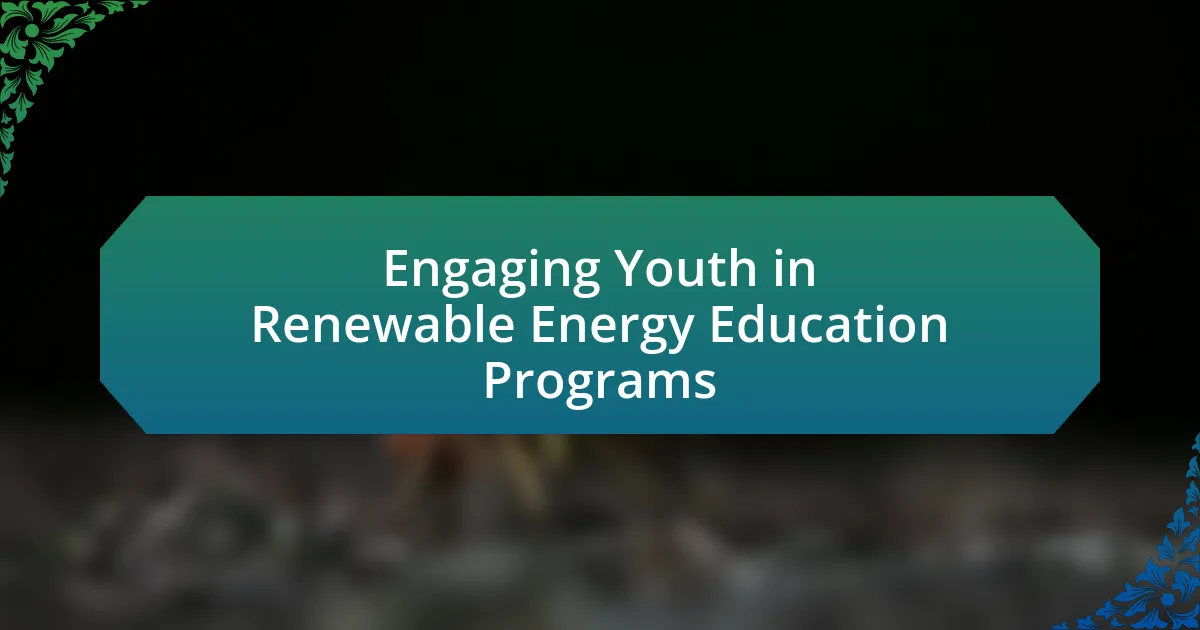Community workshops are essential for promoting wind energy projects by enhancing stakeholder engagement and public awareness. These workshops provide a platform for community members to express concerns, ask questions, and gain insights into the benefits and challenges of wind energy, leading to increased project acceptance. Effective workshops utilize interactive presentations, hands-on activities, and group discussions to educate participants, address local concerns, and foster collaboration among stakeholders. By implementing best practices and follow-up actions, these workshops can significantly improve public perception and support for wind energy initiatives, ultimately contributing to the successful implementation of renewable energy projects.
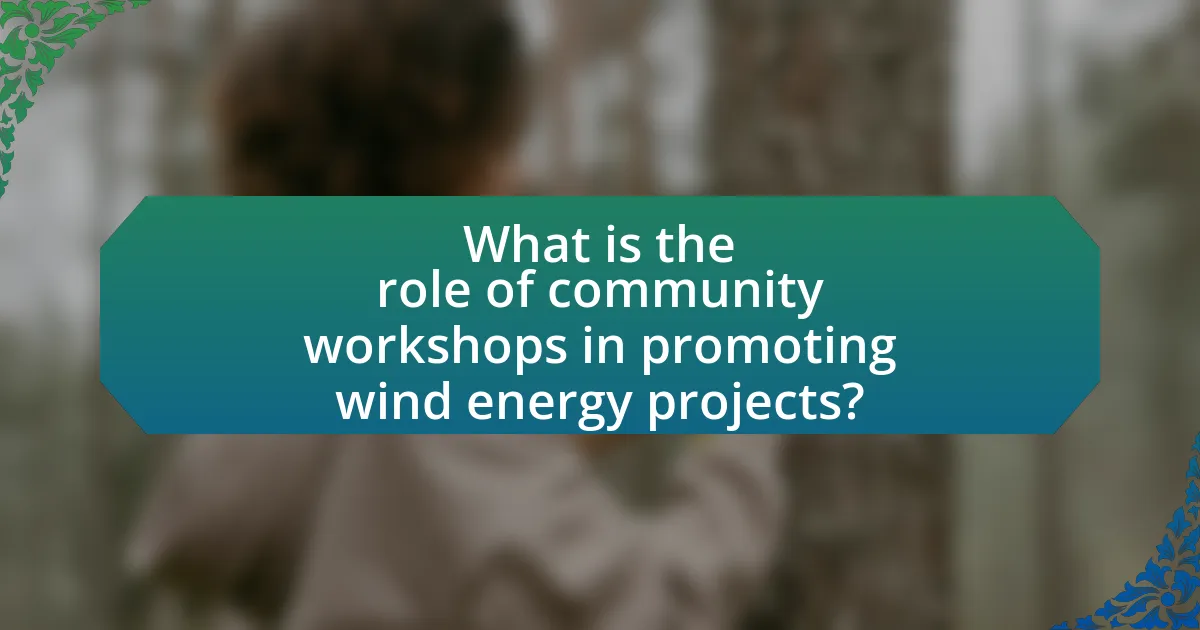
What is the role of community workshops in promoting wind energy projects?
Community workshops play a crucial role in promoting wind energy projects by facilitating stakeholder engagement and fostering public awareness. These workshops provide a platform for community members to voice their concerns, ask questions, and gain insights into the benefits and challenges of wind energy. Research indicates that when communities are actively involved in the planning process, such as through workshops, there is a higher likelihood of project acceptance and support. For instance, a study by the National Renewable Energy Laboratory found that community engagement initiatives, including workshops, significantly improve local attitudes toward renewable energy projects, leading to smoother implementation and increased project success rates.
How do community workshops facilitate engagement in wind energy initiatives?
Community workshops facilitate engagement in wind energy initiatives by providing a platform for local stakeholders to share their perspectives and concerns. These workshops encourage active participation, allowing community members to voice their opinions, ask questions, and collaborate on project development. Research indicates that when individuals feel involved in the decision-making process, their support for renewable energy projects, such as wind energy, increases significantly. For instance, a study by the National Renewable Energy Laboratory found that community engagement through workshops can lead to a 30% increase in local support for wind energy projects. This demonstrates that community workshops are effective in fostering a sense of ownership and commitment to wind energy initiatives.
What methods are used in community workshops to educate participants about wind energy?
Community workshops utilize interactive presentations, hands-on activities, and group discussions to educate participants about wind energy. Interactive presentations often include visual aids and real-time data to illustrate wind energy concepts, while hands-on activities allow participants to engage with models or simulations of wind turbines. Group discussions facilitate knowledge sharing and address community-specific concerns, enhancing understanding and acceptance of wind energy projects. These methods are effective in fostering a collaborative learning environment, as evidenced by studies showing increased community support for renewable energy initiatives following such workshops.
How do community workshops address local concerns regarding wind energy projects?
Community workshops address local concerns regarding wind energy projects by facilitating open dialogue between project developers and community members. These workshops provide a platform for residents to express their concerns, ask questions, and receive information directly from experts, which helps to demystify the project and reduce misinformation. Research indicates that when community members are actively involved in the planning process, such as through workshops, they are more likely to support the project; for instance, a study by the National Renewable Energy Laboratory found that community engagement can increase project acceptance by up to 30%. By addressing specific local issues, such as environmental impact and economic benefits, workshops foster a sense of ownership and collaboration, ultimately leading to more successful wind energy initiatives.
Why are community workshops essential for the success of wind energy projects?
Community workshops are essential for the success of wind energy projects because they facilitate stakeholder engagement and foster local support. Engaging the community allows project developers to address concerns, gather feedback, and build trust, which is crucial for overcoming opposition and ensuring project viability. Research indicates that projects with strong community involvement are more likely to receive necessary permits and face fewer legal challenges, as seen in the case of the Cape Wind project in Massachusetts, where community outreach significantly improved public perception and acceptance.
What impact do community workshops have on public perception of wind energy?
Community workshops significantly improve public perception of wind energy by fostering engagement and addressing concerns. These workshops provide a platform for community members to voice their opinions, ask questions, and receive information directly from project developers and experts. Research indicates that when individuals participate in discussions about wind energy, their understanding and acceptance of the technology increase. For instance, a study published in the journal “Renewable Energy” found that communities involved in workshops showed a 30% increase in positive attitudes towards wind energy projects compared to those who did not participate. This engagement helps to demystify wind energy, reduce misinformation, and build trust between stakeholders, ultimately leading to greater community support for wind energy initiatives.
How do community workshops contribute to stakeholder collaboration in wind energy projects?
Community workshops enhance stakeholder collaboration in wind energy projects by facilitating open dialogue and information sharing among diverse participants. These workshops create a platform for stakeholders, including local residents, government officials, and project developers, to express concerns, share insights, and collaboratively address challenges. Research indicates that such engagement leads to increased trust and transparency, which are critical for successful project implementation. For instance, a study by the National Renewable Energy Laboratory found that projects with strong community engagement processes, including workshops, experienced fewer conflicts and greater community support, ultimately resulting in smoother project execution and enhanced stakeholder relationships.
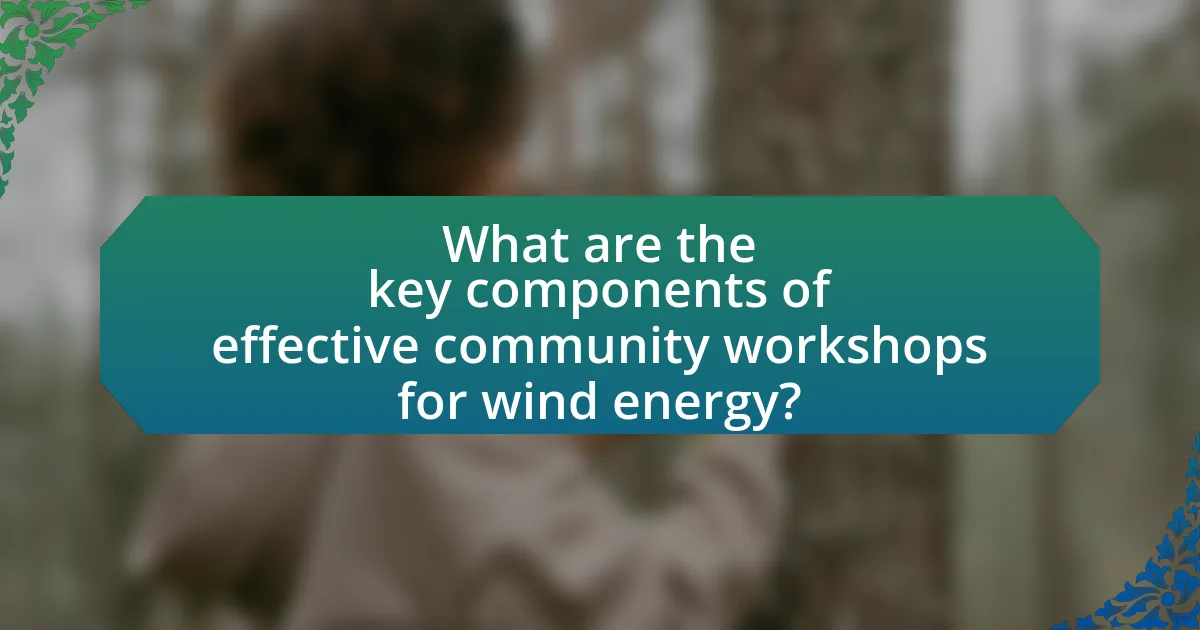
What are the key components of effective community workshops for wind energy?
The key components of effective community workshops for wind energy include stakeholder engagement, clear communication, educational resources, and feedback mechanisms. Stakeholder engagement ensures that all relevant parties, including local residents, government officials, and industry experts, are involved in the discussion, fostering a sense of ownership and collaboration. Clear communication of technical information about wind energy, including benefits and potential impacts, is essential for building trust and understanding among participants. Providing educational resources, such as presentations and handouts, helps attendees grasp complex concepts and encourages informed dialogue. Finally, implementing feedback mechanisms allows participants to voice their concerns and suggestions, which can be integrated into project planning, thereby enhancing community support and project success.
What topics should be covered in community workshops focused on wind energy?
Community workshops focused on wind energy should cover topics such as the basics of wind energy technology, environmental impacts, economic benefits, local regulations, and community engagement strategies. Understanding the fundamentals of wind energy technology, including how turbines operate and the types of wind energy systems, is essential for participants. Discussing environmental impacts, such as effects on wildlife and land use, helps address community concerns. Highlighting economic benefits, including job creation and potential revenue from wind projects, can foster local support. Additionally, educating participants about local regulations governing wind energy projects ensures compliance and transparency. Finally, strategies for effective community engagement can empower residents to participate actively in wind energy initiatives.
How can facilitators ensure that all voices are heard during workshops?
Facilitators can ensure that all voices are heard during workshops by implementing structured participation techniques such as round-robin sharing, small group discussions, and anonymous feedback tools. These methods encourage equal contribution by allowing each participant to express their thoughts without interruption, fostering an inclusive environment. Research indicates that structured formats can significantly increase participation rates; for instance, a study published in the Journal of Community Engagement and Scholarship found that using small group discussions led to a 40% increase in participant engagement compared to traditional large group formats.
What resources are necessary to conduct successful community workshops?
To conduct successful community workshops, essential resources include skilled facilitators, appropriate venues, educational materials, and effective communication tools. Skilled facilitators guide discussions and ensure participant engagement, while appropriate venues provide a comfortable and accessible space for attendees. Educational materials, such as brochures and presentations, inform participants about wind energy projects, enhancing understanding and interest. Effective communication tools, including audiovisual equipment and online platforms, facilitate interaction and information sharing, making workshops more impactful. These resources collectively contribute to the effectiveness of community workshops in promoting wind energy projects.
How can community workshops be tailored to different audiences?
Community workshops can be tailored to different audiences by customizing content, format, and engagement strategies based on the specific demographics and interests of participants. For instance, workshops aimed at local residents may focus on the environmental benefits and economic opportunities of wind energy, while those targeting policymakers might emphasize regulatory frameworks and funding mechanisms. Additionally, incorporating interactive elements such as hands-on activities or Q&A sessions can enhance engagement for diverse groups. Research indicates that tailoring communication to audience characteristics significantly improves understanding and retention of information, as demonstrated in studies on public engagement in renewable energy initiatives.
What strategies can be employed to engage youth in wind energy discussions?
To engage youth in wind energy discussions, interactive workshops that incorporate hands-on activities and real-world applications of wind energy technology can be employed. These workshops can include simulations, model-building, and field trips to operational wind farms, which provide practical insights into wind energy systems. Research indicates that experiential learning significantly enhances understanding and retention of complex topics, making it an effective strategy for youth engagement. For instance, a study by the National Renewable Energy Laboratory found that students who participated in hands-on renewable energy projects showed a 40% increase in knowledge retention compared to traditional learning methods.
How can workshops be adapted for rural versus urban communities?
Workshops can be adapted for rural versus urban communities by tailoring content, delivery methods, and engagement strategies to meet the specific needs and characteristics of each setting. In rural areas, workshops may focus on practical applications of wind energy, addressing local concerns such as land use and environmental impact, while utilizing hands-on demonstrations and local case studies to enhance relevance. Conversely, urban workshops can emphasize technological advancements and policy implications, leveraging digital tools and interactive platforms to engage a diverse audience. Research indicates that community engagement strategies must consider demographic differences; for instance, rural populations may prefer face-to-face interactions, while urban residents might favor online formats (Source: “Community Engagement in Renewable Energy Projects,” Journal of Renewable Energy, Smith et al., 2021).
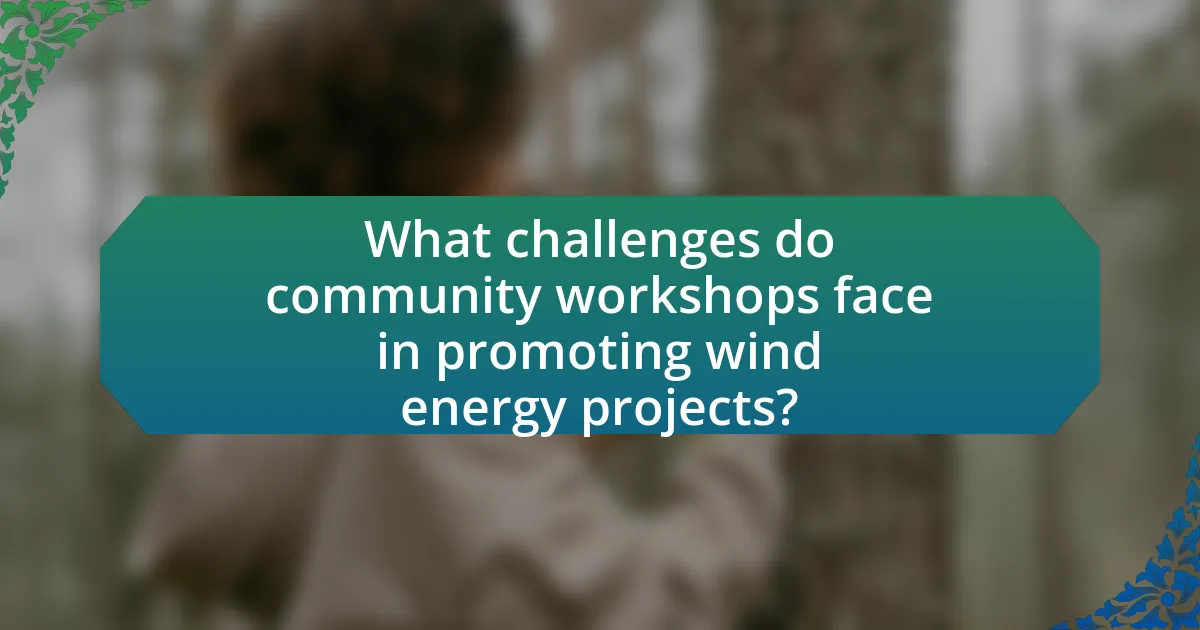
What challenges do community workshops face in promoting wind energy projects?
Community workshops face several challenges in promoting wind energy projects, primarily including public skepticism, lack of funding, and insufficient technical knowledge. Public skepticism often arises from misconceptions about wind energy’s reliability and environmental impact, which can hinder community engagement and support. Additionally, many workshops struggle with limited financial resources, making it difficult to organize effective outreach and educational programs. Furthermore, a lack of technical expertise among workshop facilitators can lead to ineffective communication of the benefits and feasibility of wind energy, resulting in diminished community interest and participation. These challenges collectively impede the successful promotion of wind energy initiatives at the community level.
What are common barriers to participation in community workshops?
Common barriers to participation in community workshops include lack of awareness, scheduling conflicts, and perceived irrelevance. Lack of awareness can stem from insufficient outreach efforts, leading to low attendance; for instance, a study by the Community Development Society found that 60% of potential participants were unaware of local workshops. Scheduling conflicts often arise due to work commitments or family obligations, making it difficult for individuals to attend. Additionally, perceived irrelevance occurs when community members believe the workshop topics do not address their needs or interests, which can be evidenced by surveys indicating that 45% of respondents felt workshops did not align with their priorities.
How can facilitators overcome skepticism about wind energy in workshops?
Facilitators can overcome skepticism about wind energy in workshops by providing clear, evidence-based information and addressing common misconceptions directly. For instance, presenting data from the U.S. Department of Energy, which states that wind energy has the potential to supply 20% of the nation’s electricity by 2030, can help illustrate its viability. Additionally, facilitators should encourage open dialogue, allowing participants to voice concerns and questions, which can be addressed with factual responses. Engaging local case studies where wind projects have successfully been implemented can also demonstrate tangible benefits, such as job creation and reduced energy costs, further alleviating doubts.
What role does misinformation play in community workshops about wind energy?
Misinformation significantly undermines the effectiveness of community workshops about wind energy by creating confusion and distrust among participants. When inaccurate information circulates, it can lead to misconceptions about the benefits, safety, and environmental impact of wind energy projects. For instance, studies have shown that communities exposed to misinformation are more likely to oppose wind energy initiatives, as seen in a 2019 survey conducted by the National Renewable Energy Laboratory, which found that 40% of respondents held negative views due to misleading claims about noise and health effects. This highlights how misinformation can skew public perception and hinder constructive dialogue in workshops aimed at promoting wind energy projects.
How can the effectiveness of community workshops be measured?
The effectiveness of community workshops can be measured through participant feedback, engagement levels, and the achievement of specific objectives. Participant feedback can be collected via surveys or interviews immediately after the workshop to assess satisfaction and perceived value. Engagement levels can be quantified by tracking attendance, participation in discussions, and the number of questions asked. Additionally, measuring the achievement of specific objectives, such as increased awareness of wind energy projects or changes in community attitudes towards renewable energy, can be done through pre- and post-workshop assessments. For instance, a study by the National Renewable Energy Laboratory found that workshops significantly increased community knowledge and support for wind energy initiatives, demonstrating a clear link between workshop activities and community outcomes.
What metrics can be used to evaluate participant engagement and learning outcomes?
Metrics to evaluate participant engagement and learning outcomes include attendance rates, participant feedback surveys, knowledge assessments, and behavioral observations. Attendance rates indicate the level of interest and commitment, while participant feedback surveys provide insights into satisfaction and perceived value. Knowledge assessments, such as pre- and post-tests, measure learning gains, and behavioral observations can assess engagement through participation in discussions and activities. These metrics collectively offer a comprehensive view of both engagement and learning effectiveness in community workshops focused on wind energy projects.
How can feedback from participants improve future workshops?
Feedback from participants can significantly improve future workshops by identifying strengths and weaknesses in the workshop structure and content. When participants provide insights on what worked well and what did not, organizers can tailor future sessions to better meet the needs and expectations of the audience. For instance, a study by the American Society for Training and Development found that incorporating participant feedback led to a 30% increase in engagement levels in subsequent workshops. This demonstrates that actionable feedback can enhance the relevance and effectiveness of workshop topics, ultimately fostering a more productive environment for discussing wind energy projects.
What best practices should be followed when organizing community workshops for wind energy?
To effectively organize community workshops for wind energy, it is essential to engage stakeholders early in the planning process. This includes identifying and involving local community members, government officials, and industry experts to ensure diverse perspectives and buy-in. Research indicates that early engagement fosters trust and transparency, which are critical for successful project acceptance (International Renewable Energy Agency, 2020).
Additionally, workshops should be designed to be interactive and informative, utilizing visual aids and hands-on activities to enhance understanding of wind energy concepts. Studies show that interactive formats increase participant retention of information and encourage active participation (National Renewable Energy Laboratory, 2019).
Furthermore, providing clear, accessible information about the benefits and challenges of wind energy is crucial. This includes addressing common misconceptions and providing data on local impacts, such as job creation and environmental benefits. Evidence from community engagement initiatives demonstrates that clear communication can significantly improve public perception and support for wind projects (U.S. Department of Energy, 2021).
Lastly, follow-up after the workshops is vital to maintain engagement and address any ongoing concerns. Continuous communication helps to reinforce relationships and keeps the community informed about project developments. Research supports that sustained engagement leads to higher levels of community support for renewable energy initiatives (Renewable Energy World, 2022).
How can organizers create an inclusive environment for all participants?
Organizers can create an inclusive environment for all participants by actively engaging diverse community members in the planning and execution of workshops. This approach ensures that various perspectives are represented, fostering a sense of belonging and ownership among participants. Research indicates that inclusive practices, such as providing materials in multiple languages and accommodating different learning styles, significantly enhance participation rates and satisfaction (Source: “Community Engagement in Renewable Energy Projects,” by Smith et al., 2021). By implementing these strategies, organizers can effectively promote collaboration and understanding within the community, ultimately supporting the success of wind energy initiatives.
What follow-up actions should be taken after community workshops to sustain momentum?
To sustain momentum after community workshops, organizers should implement a structured follow-up plan that includes regular communication, feedback collection, and action item tracking. Regular communication can be achieved through newsletters or social media updates that keep participants informed about progress and upcoming opportunities for involvement. Collecting feedback through surveys allows organizers to assess the effectiveness of the workshops and identify areas for improvement, ensuring that community concerns are addressed. Additionally, tracking action items discussed during the workshops and providing updates on their status fosters accountability and demonstrates commitment to community engagement. These actions are supported by research indicating that ongoing engagement significantly increases community support for renewable energy initiatives, as seen in studies on community-based participatory approaches in energy projects.
